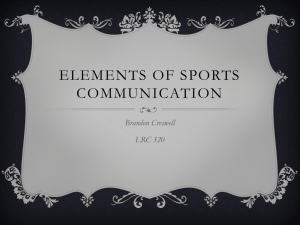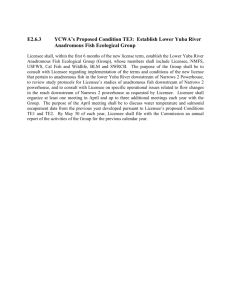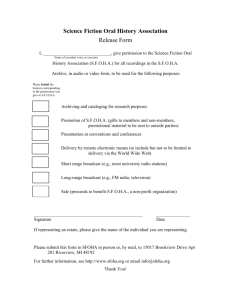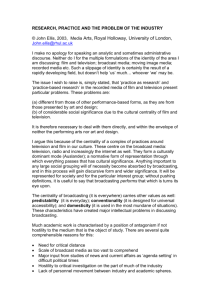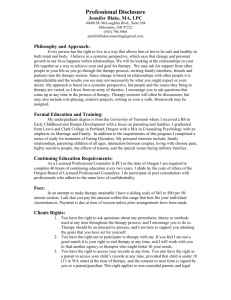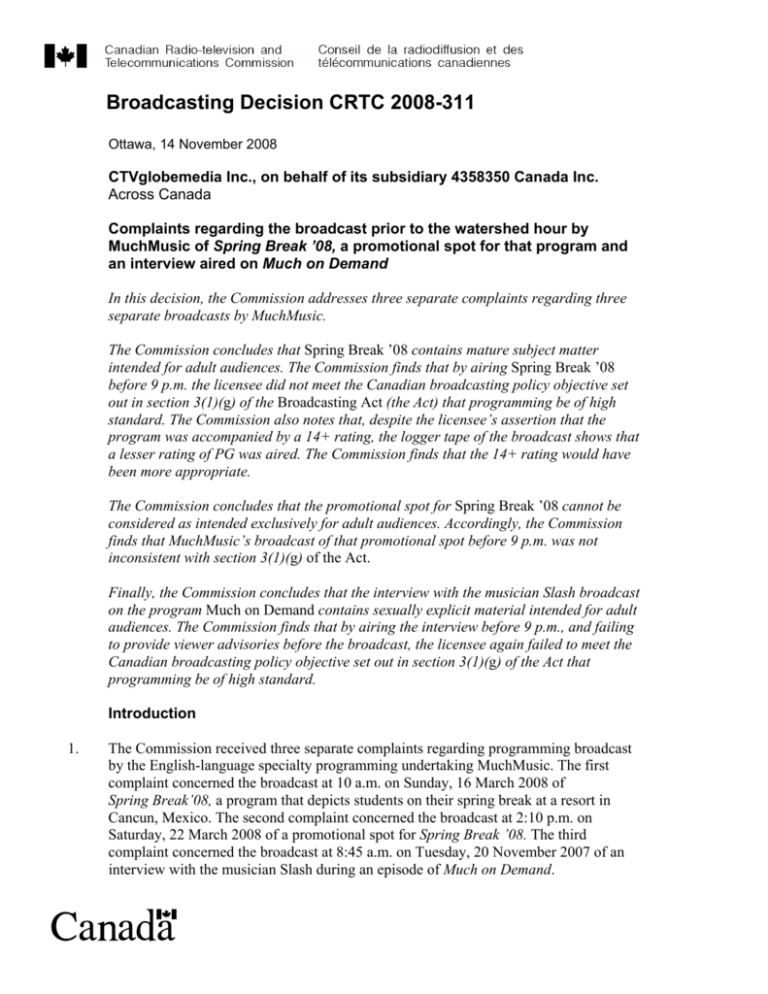
Broadcasting Decision CRTC 2008-311
Ottawa, 14 November 2008
CTVglobemedia Inc., on behalf of its subsidiary 4358350 Canada Inc.
Across Canada
Complaints regarding the broadcast prior to the watershed hour by
MuchMusic of Spring Break ’08, a promotional spot for that program and
an interview aired on Much on Demand
In this decision, the Commission addresses three separate complaints regarding three
separate broadcasts by MuchMusic.
The Commission concludes that Spring Break ’08 contains mature subject matter
intended for adult audiences. The Commission finds that by airing Spring Break ’08
before 9 p.m. the licensee did not meet the Canadian broadcasting policy objective set
out in section 3(1)(g) of the Broadcasting Act (the Act) that programming be of high
standard. The Commission also notes that, despite the licensee’s assertion that the
program was accompanied by a 14+ rating, the logger tape of the broadcast shows that
a lesser rating of PG was aired. The Commission finds that the 14+ rating would have
been more appropriate.
The Commission concludes that the promotional spot for Spring Break ’08 cannot be
considered as intended exclusively for adult audiences. Accordingly, the Commission
finds that MuchMusic’s broadcast of that promotional spot before 9 p.m. was not
inconsistent with section 3(1)(g) of the Act.
Finally, the Commission concludes that the interview with the musician Slash broadcast
on the program Much on Demand contains sexually explicit material intended for adult
audiences. The Commission finds that by airing the interview before 9 p.m., and failing
to provide viewer advisories before the broadcast, the licensee again failed to meet the
Canadian broadcasting policy objective set out in section 3(1)(g) of the Act that
programming be of high standard.
Introduction
1.
The Commission received three separate complaints regarding programming broadcast
by the English-language specialty programming undertaking MuchMusic. The first
complaint concerned the broadcast at 10 a.m. on Sunday, 16 March 2008 of
Spring Break’08, a program that depicts students on their spring break at a resort in
Cancun, Mexico. The second complaint concerned the broadcast at 2:10 p.m. on
Saturday, 22 March 2008 of a promotional spot for Spring Break ’08. The third
complaint concerned the broadcast at 8:45 a.m. on Tuesday, 20 November 2007 of an
interview with the musician Slash during an episode of Much on Demand.
2.
The Commission examined the broadcasts in question in light of the concerns raised by
the complainants, the licensee’s replies and its own review of the broadcasts. The
Commission finds that the primary issue to be determined in its consideration of these
complaints is whether the broadcasts in question were consistent with the Canadian
broadcasting policy objective set out in section 3(1)(g) of the Broadcasting Act (the Act)
that “programming originated by broadcasting undertakings should be of high standard.”
3.
In determining what constitutes programming of high standard within the meaning of the
Act, the Commission considers, among other things, the standards in effect in the
broadcasting community. The Commission is of the view that industry codes, such as the
Canadian Association of Broadcasters’ (CAB) Code of Ethics, are generally effective
benchmarks for determining current ethical standards used in broadcasting, including
whether programming is of high standard.
4.
Clause 10 of the Code of Ethics stipulates that programming that contains sexually
explicit material or coarse or offensive language intended for adult audiences shall not be
telecast before the late viewing period, defined as 9 p.m. to 6 a.m. In addition, the clause
stipulates that promotional material that contains sexually explicit material or coarse or
offensive language intended for adult audiences shall not be telecast before 9 p.m.
Clause 10 is often referred to as the “watershed hour” provision.
5.
The Commission notes that the watershed hour provision does not prohibit all
broadcasting of all material intended for adult audiences. Instead, the watershed
provision requires that content intended for adult audiences be broadcast only
between 9 p.m. and 6 a.m. The Commission has previously determined that
programming intended for adult audiences is not limited to that containing strictly
sexually explicit material or coarse or offensive language but also includes
programming whose overall theme is clearly unsuitable or unintended for younger
viewers (see Complaints regarding the broadcast by the Canadian Broadcast
Corporation of Sex Traffic and Old School prior to the watershed hour,
Broadcasting Decision CRTC 2006-668, 11 December 2006).
6.
Clause 11 of the Code of Ethics stipulates that to assist consumers in making their
viewing choices, when programming includes mature subject matter or scenes with
nudity, sexually explicit material, coarse or offensive language, or other material that
may offend viewers, broadcasters shall provide a viewer advisory. These advisories
are required for programming containing this type of content that is broadcast in late
viewing hours and programming broadcast outside late viewing hours that contains
material not suitable for children.
7.
The Code of Ethics is administered by the Canadian Broadcast Standards Council
(CBSC) for private broadcasters who are members of the CBSC. Although
MuchMusic is not a member of the CBSC, the Commission considers that, given the
objectives of the Act, the licensee is required to adhere to the same broadcast
standards as the industry as a whole. Canadian viewers are entitled to expect that all
broadcasters adhere to current social accountability standards designed to protect the
youngest viewers.
Spring Break ‘08
The program
8.
Spring Break ’08 depicts young adults engaging in wild parties, beach antics and
sexualized jokes and innuendo during their spring break at a resort in Cancun, Mexico.
The program focuses on a series of challenges that the two hosts assign to each other.
These challenges include urinating on a tree in public, finding three men who are willing
to wear elaborate pink thong underwear on a crowded beach and convincing three pairs
of women to make out.
The complaint
9.
In a letter to the Commission dated 16 March 2008, the complainant stated that, in his
view, Spring Break ’08 displayed “truly disgusting antics for a show primarily watched
by teenagers.” The complainant submitted that a viewer could actually see the host’s
“pee going against the tree” and still hear some of the coarse language that had been
bleeped. According to the complainant, the program showed nudity in the form of “bare
butts” as well as “breasts covers [sic] with boobs sensors [sic].” He also pointed out that
the program was broadcast on Sunday morning.
Licensee’s reply
10.
In its 2 April 2008 response to the complainant, the licensee described the program as “a
lighthearted look at the longstanding social tradition among North American youth to go
south - in this case to Cancun, Mexico, - during the ‘spring break’.” According to the
licensee, “sexually suggestive contests, beach-clad young adults, juvenile behaviour and
wild parties are all a major part of the experience.” The licensee maintained that “while
shooting and editing the show, the producers strove to stay true to this spirit of ‘spring
break’ without depicting any inappropriate material such as sexually explicit scenes or
explicit coarse language.”
11.
The licensee affirmed its commitment to adhere to the CAB’s Code of Ethics and
Equitable Portrayal Code and the CAB Violence Code as well as MuchMusic’s own
programming policy. The licensee maintained that all explicit coarse language was
bleeped out and all explicit nudity, except for bare bottoms which it did not consider
explicit, were either blurred over or covered by black bars in order to remain consistent
with the CAB codes. It also noted that the program was aired with a viewer advisory and
assigned an Action Group on Violence in Television (AGVOT) “PG “code of 14+, which
allows for mature themes, profanity and scenes of sexual activity or nudity within the
context of narrative or theme. While the licensee acknowledged that “the scenes may be
considered puerile”, it contended that the program did not contravene the CAB codes.
Commission’s analysis and determinations
12.
Based on its review of the logger tape of the program provided by MuchMusic, the
Commission finds that the licensee did take measures aimed at ensuring that the
broadcast was consistent with the CAB codes governing the content of material
broadcast before 9 p.m. The licensee clearly advised viewers that the program contained
coarse language, nudity, mature themes and scenes of sexuality that may not be suitable
for younger viewers. It aired a detailed viewer advisory, both as a visual message and a
voice-over, prior to the program and after each commercial break. The Commission
considers that the licensee’s efforts to fully inform viewers about Spring Break ‘08’s
content are consistent with the viewer advisory provisions of the Ethics Code (clause 11).
The Commission also notes that the broadcast made frequent use of techniques such as
pixelization or black “censorship” bars to partially block or obscure exposed body parts.
Bleeping of some explicit language was also used.
13.
Nevertheless, the Commission’s review of the broadcast found that the program contains
no narrative or theme beyond the depiction and promotion of juvenile, sexualized or
alcohol-fuelled behaviour. The program’s narrative structure, in which the host VJs
assign each other a series of “challenges” at the beginning of the program and attempt to
fulfil them by the end, serves only to encourage more creative examples of such
behaviour. These challenges include scenes of the host urinating on a tree and strippers
removing their clothes in a boxing-ring-like enclosure in a nightclub, as well as a
demonstration of how to urinate in a swimming pool, several scenes of men streaking or
wearing thong underwear in hotel hallways and on beaches, and a scene of participants
licking alcohol off the stomachs, chests or cleavage of others. In addition to censored
instances of the word “fuck” and its derivatives, the program also contained frequent
instances of uncensored coarse language such as “bullshit,” “pissing,” “bastard,” “shit,”
“damn” and “ass,” and a variety of verbal references to excessive alcohol consumption
and sexual activity.
14.
The Commission considers that the persistence of the themes described above in the
one-hour broadcast suggests that the program is not appropriate for children. The
program’s sole focus is on activities intended for adults, with no other storyline or
element that is appropriate for younger audiences. Irrespective of the target audience, the
Commission finds that the program is not appropriate for daytime broadcast.
15.
The Commission further notes that, in its reply to the complainant, the licensee indicated
that the broadcast in question was assigned an AGVOT rating of 14+. However, the
rating that aired on the logger tape of the broadcast received by the Commission was PG.
In the Commission’s view, the program’s content is more consistent with the “strong or
frequent use of profanity” and “scenes of nudity and/or sexual activity within the context
of narrative or theme” permitted by a 14+ rating. The Commission does not consider that
a PG rating, which allows for “infrequent and mild profanity,” “mildly suggestive
language,” “brief scenes of nudity,” and “limited and discreet sexual references or
content when appropriate to the storyline or theme,” is accurate or appropriate for this
broadcast. The Commission therefore determines that the PG rating assigned to this
program was insufficient.
16.
The Commission acknowledges that the licensee’s use of advisories was an important
tool to inform prospective viewers of the potential risks associated with viewing the
program in question. The Commission nevertheless finds that the use of advisories does
not excuse the potential harm to children of broadcasting, prior to the watershed hour,
material that is clearly intended for adult audiences.
17.
The Commission also recognizes the other measures taken by the licensee to mitigate the
program’s sexually explicit content as well as its coarse and offensive language intended
for adult audiences. The Commission finds that these measures were an important
component of any broadcaster’s exercise of its responsibility to manage concerns
regarding program content. In the present case, however, the Commission finds that the
measures were insufficient to protect children from exposure to content that is
inappropriate for them.
18.
In light of the above, the Commission finds that, in broadcasting Spring Break ‘08 before
9 p.m., the licensee did not meet the Canadian broadcasting policy objective, set out in
section 3(1)(g) of the Act, that programming be of high standard.
Promotional spot for Spring Break ‘08
19.
The 30-second promotional spot in question advertised an upcoming broadcast of
Spring Break ‘08. It contains several short clips from the full program showing young
people dancing on a beach in bathing suits, a young woman removing her bikini in
waist-deep water, a young man licking a beverage off a woman’s cleavage, and several
rear views of men running naked down a hotel hallway or into the ocean.
The complaint
20.
In a letter dated 22 March 2008 to the CBSC, another complainant expressed concern
about MuchMusic’s broadcast on a weekend afternoon, when children were likely to be
watching, of a promotional spot for Spring Break ’08 that presented nude men. Because
MuchMusic is not a member of the CBSC, the complaint was forwarded to the
Commission on 25 March 2008.
Licensee’s reply
21.
In its 17 April 2008 response to the complainant, the licensee again affirmed its
commitment to adhering to the CAB’s Code of Ethics and Equitable Portrayal Code and
the CAB Violence Code as well as MuchMusic’s own programming policy.
22.
The licensee submitted that “when creating the promotional spot for the show, our promo
producer wanted to convey the free-spirited nature of Spring Break ‘08.” The licensee
described the scene in question as a three-second clip in which several young men were
dared to remove their swimming trunks and run into the ocean. It stated that:
While you could see their bare bums, all frontal nudity was pixilated. We
do not believe this instance of obscured nudity constitutes material that is
inappropriate for telecast during the day, particularly in the non-sexual,
humorous and very brief context in which it was shown during this
promo.
Complainant’s reply to the licensee
23.
In a letter to the Commission dated 18 April 2008, the complainant indicated that he was
not satisfied with the licensee’s response. The complainant again asked the Commission
to investigate his concerns.
Commission’s analysis and determinations
24.
Based on its review of the promotional spot, the Commission agrees with the licensee’s
assertion that the male nudity shown in that broadcast was not presented in a sexually
explicit manner. The Commission considers that naked bottoms in themselves do not
constitute sexually explicit material.
25.
The Commission also found that certain scenes that appeared in the full broadcast of
Spring Break ’08 depicting greater degrees of sexualization or nudity, such as a nightclub
scene involving strippers, are not present in the promotional spot. Any profanity is
bleeped out and, while there is some non-sexual nudity and some sexualized behaviour
that might be considered juvenile, the promotional spot does not contain sexually explicit
material.
26.
The Commission notes that the promotional spot is meant only to provide a glimpse of
what the producers view as the more intriguing parts of the full episode. The brevity of
the promotional spot does not allow for the development of an overarching theme or
storyline, as might be expected in a longer program. The Commission’s concerns
regarding the full Spring Break ‘08 program (i.e., the high concentration of
adult-oriented material and the lack of another overriding theme) are thus less applicable
to this brief promotional spot.
27.
In light of the above, the Commission determines that the promotional spot cannot be
considered as intended exclusively for adult audiences. Accordingly, the Commission
finds that MuchMusic’s broadcast of the promotional spot before 9 p.m. is not
inconsistent with section 3(1)(g) of the Act.
Interview with Slash on Much On Demand
The program
28.
Much On Demand is an entertainment magazine program featuring music videos,
interviews with musicians and pop culture celebrities, and coverage of
entertainment-oriented events. The program in question was aired on 20 November 2007
from 8 a.m. to 9 a.m. It featured an interview with the guitarist Slash, formerly of the
rock music group Guns N’ Roses.
The complaint
29.
In a letter to the Commission dated 22 November 2007, a complainant expressed concern
about the interviewer’s decision to read an excerpt from Slash’s book detailing an
unprotected sexual experience with multiple partners. In the complainant’s view, the
quotation was “most inappropriate and unfit for television in general.” The complainant
added that there were many other quotations from the book that would have been more
appropriate to read on air. He stated that “what was most disturbing is that this was now
being replayed at a ‘prime time’ for young children television viewing.”
Licensee’s reply
30.
In its 16 January 2008 response to the complainant, the licensee contended that the
quotation read was meant to be humorous and that the host made an effort to adhere to
broadcast standards. The licensee stated:
The excerpt describes a sexual scene, but … [the host] was careful to
avoid the more explicit words by using the word ‘bleeping’ instead of a
profanity, and ‘finished’ instead of the more explicit word that was
actually used in the book. Because this description of a sexual scene was
not explicit we do not think it was inappropriate for daytime telecast to
our teen and young adult audience.
31.
The licensee acknowledged that it should have aired a viewer advisory before the
broadcast warning that the program’s content might offend some viewers. It apologized
for that oversight.
Complainant’s reply to the licensee
32.
In a letter to the Commission dated 23 January 2008, the complainant indicated that he
was not satisfied with the licensee’s response. The complainant maintained that, despite
the use of less explicit language, the details of the sexual act being described remained
clear and were inappropriate for the relatively young audience. He also pointed out that
the licensee’s reply had not addressed the fact that the program in question aired before
9 p.m.
Commission’s analysis and determinations
33.
The Commission’s review of the logger tape of the broadcast in question found that the
licensee failed to air viewer advisories concerning the program’s content before the
program or after any commercial breaks. The Commission finds that the licensee’s
failure to fully inform viewers about the program’s content is inconsistent with the
viewer advisory provisions of the Ethics Code (clause 11).
34.
The Commission further finds that, although all coarse or offensive language in the book
excerpt was edited out by the host, the description of the scene remains sexually explicit
due to the level of detail given. The shared partner, lack of protection and ejaculation are
clear to viewers regardless of the language used.
35.
The Commission is also concerned with the host’s presentation. The host described the
excerpt as prompting her to “laugh out loud,” “the funniest thing she’s ever read” and
“the greatest”. She stated that the situation described was an “amazing moment” in
Slash’s life. Slash expressed hesitation and concern about “the ratings” before the excerpt
was read on air. However, apart from the language used, the host did not appear
concerned about the content. The implication to the audience of the host’s tone could
reasonably be that unprotected sex with multiple partners is inconsequential, worth
laughing at, and perhaps even admirable.
36.
The Commission notes that detailed and explicit portrayal of sexual activity is considered
to be material intended for adult audiences, and is therefore subject to scheduling and
advisory requirements. Furthermore, explicit descriptions of particular sex acts at times
of day when children are likely to be listening have been found to contravene established
standards.1
37.
In light of the above, the Commission finds that by airing the interview before 9 p.m.,
and failing to provide viewer advisories before the broadcast, the licensee again failed to
meet the Canadian broadcasting policy objective set out in section 3(1)(g) of the Act that
programming be of high standard.
Conclusion
38.
The Commission expects MuchMusic to ensure that the scheduling of programs
containing sexually explicit material or coarse or offensive language intended for adult
audiences is consistent with the broadcast industry standard requiring that such material
be broadcast after 9 p.m. The Commission also expects MuchMusic to provide viewer
advisories and a proper program rating for such programming, as appropriate. The
Commission will review MuchMusic’s compliance with these obligations at its next
licence renewal.
Secretary General
This decision is to be appended to the licence. It is available in alternative format upon
request, and may also be examined in PDF format or in HTML at the following Internet
site: http://www.crtc.gc.ca.
1
The CBSC dealt with similar issues in CBSC Decisions 00/01-0688, CFMI-FM re. Brother Jake Morning Show,
01/02-0267, CFNY-FM re. The Show with Dean Blundell, and 01/02-0713 CIRK-FM re K-Rock Morning Show.


